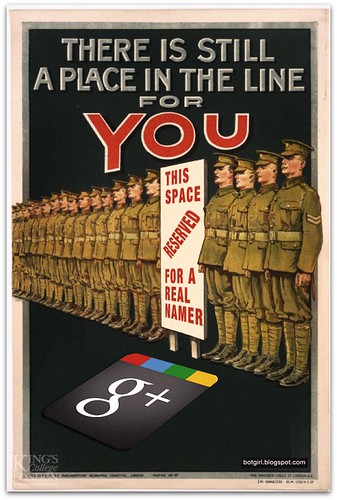 |
| From a series of faux propaganda posters |
Unfortunately, Google's justification for their policy is the red herring of "connecting with people":
The well-crafted innocuousness of their rationale belies the profoundly chilling impact of a real name policy on free and open public discourse. When each post we make is permanently tattooed on our public record, self-censorship is self-preservation. The Brave New World that Google, the Zuckerbergs and the U.S. Congress are pushing us towards would deliver our complete virtual history to anyone typing our name into a search engine:Google+ makes connecting with people on the web more like connecting with people in the real world. Because of this, it’s important to use your common name so that the people you want to connect with can find you . . . If you’re referred to by more than one name, only use the one that commonly identifies you, and place the rest in the “Other names” or “Nickname” section of your profile. From Your Name and Google Profiles.
- Employers, Insurance agencies, load examiners and private investigators
- Children, parents, neighbors and ex-spouses
- Stalkers, griefers and others who may seek to do harm
- And god forbid if you're ever going to run for public office
A real name policy ironically works against people "being real" in public forums by making it too risky to bare our hearts and souls. A real name environment puts a damper on communication that is counter to the dominant culture or far enough outside of the mainstream to have potentially negative ramifications on employment or acceptance in one's physical world community.
The main argument against pseudonymity is that it encourages people to behave badly. But from what I've seen, the vast majority of those disrupting civil conversation online aren't people who hide behind pseudonyms, but assholes who hide behind narcissism or true-believers who are thrilled to spout self-righteous vitriole under their real, identified name.
The impact of pseudonymity on behavior is actually quite the opposite. Pseudonymity is one of the most empowering and democratizing aspects of virtual life. It levels the playing field and enables merit-centric reputation. It encourages the expression of innovative thinking by providing a safe environment for personal growth and creative experimentation. I write this from more than three years of daily experience in social networks that are largely composed of those with pseudonymous identities.
Google's policy wouldn't matter much if it were from a typical start-up social network. We could just opt on and go on our merry way. But because of Google's dominant and ubiquitous role in the virtual environment, being excluded from their services will diminish our voices in mainstream virtual discourse. Our blogs, websites, video and other creative output will be at a competitive disadvantage as search results are tailored to social circles. Whatever final policy Google enacts is likely to be influential on other companies and on public policy. So it's time for Netizens to speak out and turn the tide.

9 comments:
Although this is not currently seen as such, the alternative is to search out and empower those sites that do not subscribe to this manipulation.
I agree with you that alternative sites like Diaspora are options we should keep supporting. But I think it's important to try to influence the mainstream as well, for the reasons I noted in the post.
We never had this problem with myspace.
Saddly a movement is afoot that takes the public opinion out of the equation. Like all other security iniatives that have happened in recent years the move to data mine citizens is just another disguised for societal good and public security. The defenseless and vulnerable with no voice will get walked upon and ignored.
Right: it is important. Only thing is, it's pretty difficult to come up with yet more ways to put pressure on Google. I mean, considering the repeated public embarrassments they've already inflicted on themselves with this, how can we put it any more in their face than it is already?
Just in passing, the whole "data mining" thing, and the marketability of the marketing data... that's all misdirection. It's nothing to do with that, as every reasonably clued-in marketing person has already said.
I think, rather, the whole "real names" policy is simply to minimize the distance between Plus and Wallet. (Yes, that's equally unimaginative, but unlike real-name-only marketing data, at least there's not yet overwhelming evidence that real-name-only financial service is a dumb idea.)
Are their any open letters to google from the people to help let them know that their are many who feel that the real name is an invaision of privacy o.0? Like the neturtralty groups do ?
I was wondering if the it's true about the "other field" I put LOM Runner in the "other names" field.. and I know people who did it vice versa. So I'm wondering if people put "A" real sounding name in the "other" field, would you still get flagged?
i find the statement "Google+ makes connecting with people on the web more like connecting with people in the real world" particularly disingenuous. i certainly do not wear a name badge with my full name on it everywhere i go in public. i certainly do not give out my full name whenever i talk with someone in a cafe or a bar. "more like the real world" my ass!
Connecting with people is the main reason I don't want to do it. When I got on Facebook it was universities only and then they opened it up to the whole world. Suddenly people I'd long forgotten about and wished had forgot about me were not only contacting me, they were telling their friends I disliked even more where to find me!
Post a Comment